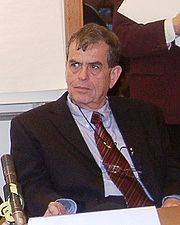- Aaron Ciechanover
-
Aaron Ciechanover 
Born October 1, 1947
Haifa, British Mandate of PalestineNationality Israel Fields Biology Known for ubiquitin-mediated protein degradation Notable awards Nobel Prize in Chemistry (2004) Aaron Ciechanover (אהרן צ'חנובר) (born October 1, 1947) is an Israeli biologist, and Nobel laureate in Chemistry.
Contents
Biography
Ciechanover was born in Haifa, British mandate of Palestine, a year before the establishment of the State of Israel. His family had immigrated from Poland before the Second World War.
He earned a master's degree in science in 1971 and graduated from Hadassah Medical School in Jerusalem in 1974. He received his doctorate in biochemistry in 1982 from the Technion (the Israel Institute of Technology), in Haifa. He is currently a Technion Distinguished Research Professor in the Ruth and Bruce Rappaport Faculty of Medicine and Research Institute at the Technion.
Ciechanover is a member of the Israel Academy of Sciences and Humanities, the Pontifical Academy of Sciences, and is a foreign associate of the United States National Academy of Sciences.
In 2005, he was voted the co-31st-greatest Israeli of all time, in a poll by the Israeli news website Ynet to determine whom the general public considered the 200 Greatest Israelis.[1]. As one of Israel's first Nobel Laureates in Science, he is honored in playing a central role in the history of the State of Israel and in the History of the Technion - Israel Institute of Technology.
Publications
- Ciechanover, A., Hod, Y. and Hershko, A. (1978). A Heat-stable Polypeptide Component of an ATP-dependent Proteolytic System from Reticulocytes. Biochem. Biophys. Res. Commun. 81, 1100–1105.
- Ciechanover, A., Heller, H., Elias, S., Haas, A.L. and Hershko, A. (1980). ATP-dependent Conjugation of Reticulocyte Proteins with the Polypeptide Required for Protein Degradation. Proc. Natl. Acad. Sci. USA 77, 1365–1368.
- Hershko, A. and Ciechanover, A. (1982). Mechanisms of intracellular protein breakdown. Annu. Rev. Biochem. 51, 335–364.
Awards
- In 2000, Ciechanover received the Albert Lasker Award for Basic Medical Research.
- In 2003, he was awarded the Israel Prize, for biology.[2][3]
- in 2004, he was awarded Nobel Prize in Chemistry for his discovery with Avram Hershko and Irwin Rose, of ubiquitin-mediated protein degradation.[4][5] The ubiquitin-proteasome pathway has a critical role in maintaining the homeostasis of cells and is believed to be involved in the development and progression of diseases such as: cancer, muscular and neurological diseases, immune and inflammatory responses.
References
- ^ גיא בניוביץ' (June 20, 1995). "הישראלי מספר 1: יצחק רבין – תרבות ובידור". Ynet. http://www.ynet.co.il/articles/0,7340,L-3083171,00.html. Retrieved July 10, 2011.
- ^ "Israel Prize Official Site (in Hebrew) – Recipient’s C.V.". http://cms.education.gov.il/EducationCMS/Units/PrasIsrael/Tashsag/Tzechanover/KorotHaimAromTzechanover.htm.
- ^ "Israel Prize Official Site (in Hebrew) – Judges' Rationale for Grant to Recipient". http://cms.education.gov.il/EducationCMS/Units/PrasIsrael/Tashsag/Tzechanover/NimokyHsoftim.htm.
- ^ Nobel citation
- ^ Aaron Ciechanover and Avram Hershko 2004 Nobel in Chemistry – A web article
External links
See also
- List of Israel Prize recipients
- List of Jewish Nobel laureates
2004 Nobel Prize laureates Chemistry: - Aaron Ciechanover (Israel)
- Avram Hershko (Israel)
- Irwin Rose (United States)
Economic Sciences: Literature: Peace: Physics: Physiology or Medicine: - Nobel Prize winners: 02
- 03
- 04
- 05
- 06
- 07
- 08
- 09
- 10
- 11
Categories:- 1947 births
- Members of the European Molecular Biology Organization
- Living people
- Hebrew University of Jerusalem alumni
- Israel Prize in biology recipients
- Israeli Nobel laureates
- Israeli physicians
- Jews in Ottoman and British Palestine
- Nobel laureates in Chemistry
- People from Haifa
- Israeli Jews
- Israeli people of Polish origin
- Technion – Israel Institute of Technology faculty
- Members of the Pontifical Academy of Sciences
- Members of the Israel Academy of Sciences and Humanities
Wikimedia Foundation. 2010.
